
Journal of East Asia and International Law
Scope & Guideline
Innovating Legal Thought for a Changing International Landscape
Introduction
Aims and Scopes
- International Law and Human Rights:
A significant focus on how international law intersects with human rights issues, including humanitarian law, refugee protection, and indigenous rights. - Regional Studies and Geopolitical Analysis:
Exploration of legal implications and strategies within the context of East Asian countries, reflecting on regional dynamics such as BRICS, China's influence, and ASEAN relations. - Environmental Law and Sustainable Development:
Discussion of legal frameworks regarding environmental protection, sustainable development, and climate change in relation to international agreements and local practices. - Technology and Cybersecurity Law:
Examination of contemporary challenges in law concerning technology, including cybersecurity, data privacy, and the legal implications of innovations like artificial intelligence. - Trade Law and Economic Relations:
Investigation of international trade law, focusing on issues such as bilateral agreements, trade wars, and economic strategies among East Asian nations. - Maritime Law and Territorial Disputes:
Analysis of legal frameworks governing maritime issues, including territorial disputes in the South China Sea and international shipping regulations.
Trending and Emerging
- Cybersecurity and Digital Law:
There is an increasing focus on legal issues surrounding cybersecurity, data privacy, and the implications of digital technologies, reflecting the growing significance of these topics in global governance. - Climate Change and Environmental Governance:
Emerging themes related to climate change law and sustainable development are becoming more prominent, highlighting the urgent need for legal frameworks that address environmental challenges in the region. - Geopolitical Tensions and Legal Responses:
A surge in discussions regarding legal frameworks addressing geopolitical tensions, particularly relating to China, the South China Sea, and regional security, indicates heightened interest in the intersection of law and international relations. - Humanitarian Law and Refugee Issues:
There is a notable trend towards exploring humanitarian law in the context of contemporary crises, including refugee protection and responses to displacement due to climate change. - Innovations in International Trade Law:
Emerging discussions on the legal implications of trade innovations, such as digital trade and the impact of economic shifts caused by global events, are increasingly present in the journal.
Declining or Waning
- Classical International Relations Theory:
There has been a noticeable decrease in papers dedicated to traditional theoretical frameworks of international relations, possibly indicating a shift towards more practical and region-specific analyses. - Historical Legal Analysis:
Fewer articles focus on historical perspectives of international law, suggesting a trend towards contemporary issues and forward-looking legal frameworks. - Domestic Legal Systems in Isolation:
The journal seems to be moving away from discussions centered solely on the domestic legal systems of East Asian countries without a clear international context, favoring more integrative approaches. - Cultural Heritage Law:
Legal discussions on the protection of cultural heritage have become less frequent, reflecting perhaps a broader focus on pressing contemporary issues such as technology and environmental law. - Comparative Law without Regional Context:
There is a decline in purely comparative legal studies that do not specifically address East Asian contexts, indicating a preference for analyses that relate back to regional implications.
Similar Journals
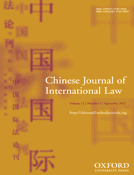
Chinese Journal of International Law
Exploring the Nexus of Law and Global RelationsChinese Journal of International Law, published by Oxford University Press, stands at the forefront of legal scholarship, focusing on critical issues in international law and its intersection with political science and international relations. With an ISSN of 1540-1650 and an E-ISSN of 1746-9937, this esteemed journal provides a critical platform for the dissemination of research that contributes to the understanding of international legal frameworks, particularly those relevant to China and its role in the global legal landscape. Its rigorous peer-reviewed articles reflect high scholarly standards, supported by its impressive Q1 ranking in Law and Q2 ranking in Political Science and International Relations as of 2023. The journal's impact factor signifies its relevance, while its Scopus rankings illustrate its presence among leading journals in its field, with a Social Sciences rank in Law at #503 out of 1025. As the journal converges in its focus from 2008 to 2024, it continues to engage a global audience of researchers, academics, and practitioners, making significant contributions to the ongoing discourse in international law.
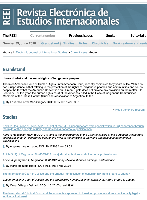
Revista Electronica de Estudios Internacionales
Advancing Knowledge in Global RelationsRevista Electronica de Estudios Internacionales is a prominent academic journal dedicated to the exploration of international studies, published by the esteemed ASOC ESPANOLA PROFESORES DERECHO INT & RELACIONES INT-AEPDIRI. Based in Spain, this journal has embraced an Open Access model since its inception in 2000, allowing researchers, students, and professionals to freely access and disseminate significant findings in the field. With an ISSN of 1697-5197, the journal highlights critical issues surrounding international law and relations, maintaining a vital role in the ongoing discourse within the academic community. Currently categorized as Q4 in the Law field and ranked #755 out of 1025 within the Scopus database, the journal offers a platform for innovative thinking and scholarly contributions, which are particularly important in today's rapidly evolving global scenario. Explore the latest research and insights from 2019 to 2023 in this essential resource for those engaged in the study and practice of international relations.

Netherlands International Law Review
Illuminating Contemporary Issues in Global LawNetherlands International Law Review is a prestigious academic journal dedicated to the exploration and analysis of international law. Published by Springer International Publishing AG, this journal has established itself as a leading platform for scholarly discourse since its inception in 1953. With its ISSN 0165-070X and E-ISSN 1741-6191, it is indexed in high-impact databases and has achieved an impressive Q1 ranking in the field of Law as of 2023, further solidifying its reputation as a critical resource for legal scholars and practitioners. With its latest Scopus rank of #243 out of 1025 in the Social Sciences (Law) category, the journal exemplifies the high level of research excellence it promotes. The Netherlands International Law Review aims to foster insightful discussions on contemporary issues in international law, making it an invaluable resource for researchers, professionals, and students alike who seek to stay informed on the latest developments and theoretical advancements in this dynamic field. Access to current issues is available through traditional subscription formats, providing a comprehensive view of the evolving legal landscape.

DUKE LAW JOURNAL
Illuminating the path of legal innovation.DUKE LAW JOURNAL is a premier scholarly journal published by Duke University, dedicated to advancing the field of law through rigorous research and critical analysis. With an ISSN of 0012-7086 and an E-ISSN of 1939-9111, this distinguished journal has established itself as a vital resource for legal scholars, practitioners, and students alike. As a member of the top quartile (Q1) in Law for 2023 and ranking 267 out of 1025 in the Scopus database, the journal showcases high-impact articles that contribute to the contemporary discourse on legal theory, practice, and reform. While it does not currently offer open access, its rich archive since 1978 provides invaluable insights into significant legal developments in the United States and beyond. The DUKE LAW JOURNAL serves not only as a repository of knowledge but also as a forum for diverse perspectives, making it an essential tool for anyone engaged in the legal profession or academia.

Manchester Journal of International Economic Law
Cultivating Insights for Tomorrow's Legal EconomistsThe Manchester Journal of International Economic Law is a pivotal academic publication in the realms of international law and economic law, established to foster critical discourse and scholarship in these vital areas. Published by ELECTRONIC PUBL LTD, this journal has been contributing to the academic community since its inception, with coverage spanning from 2013 to 2024. While it does not currently offer open access, it nonetheless provides valuable insights into complex legal and economic frameworks, earning a respectable Q3 ranking in Law and a Q4 ranking in Economics and Econometrics as of 2023. Researchers and professionals will find the journal's rigorous peer-review process essential for disseminating high-quality research, as it aims to bridge the gap between legal theory and economic applications, thus enriching both fields. Scholars interested in the intersection of these disciplines will benefit from accessing its rich content, fostering innovative dialogue and collaboration in the dynamic landscape of international economic law.
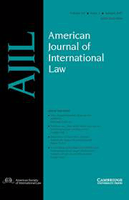
AMERICAN JOURNAL OF INTERNATIONAL LAW
Fostering Scholarly Dialogue in Law and PoliticsThe American Journal of International Law, published by Cambridge University Press, stands as a crucial platform for scholarly discourse in the fields of law, political science, and international relations. With a longstanding tradition since its inception in 1937, this prestigious journal has maintained a remarkable reputation, reflected in its Q1 ranking in both Law and Political Science and International Relations as of 2023. It is recognized for its rigorous peer-review process and impactful contributions to the understanding of legal frameworks and international governance. Researchers and practitioners alike will find the journal invaluable, not only for its comprehensive analyses and original research articles but also for its commitment to advancing the field. Although it does not offer open access, its accessibility through academic institutions ensures that a broad audience can engage with its content, making it essential reading for those involved in international legal scholarship.

Revista de Derecho Comunitario Europeo
Exploring the Intersection of Law and Politics in EuropeRevista de Derecho Comunitario Europeo, published by CENTRO ESTUDIOS POLITICOS CONSTITUCIONALES, serves as a vital platform for scholarly dialogue in the fields of Law, Political Science, and International Relations. Established in 2008, this esteemed journal focuses on the analysis of European Community Law, providing insightful articles that explore the dynamic intersection of legal frameworks and political science within the European context. Although currently categorized in the Q4 quartile for its fields, the journal is dedicated to enhancing its impact and visibility, particularly among researchers and practitioners interested in the evolution of European legal structures. While it does not offer open access, its rigorous peer-review process ensures the publication of high-quality research, making it a crucial resource for students and professionals aiming to deepen their understanding of contemporary legal and political issues in Europe. The journal's commitment to advancing scholarship in these areas is reflected in its ongoing publication through 2024, situated in Madrid, Spain.

Legal Issues of Economic Integration
Empowering Scholars with Legal Perspectives on Economic IntegrationLegal Issues of Economic Integration is a distinguished academic journal published by KLUWER LAW INT, focusing on the intricate interplay between legal frameworks and economic integration processes. With an ISSN of 1566-6573 and an E-ISSN of 1875-6433, the journal has carved a niche for itself in the field, evidenced by its 2023 rankings placing it in the Q3 quartile for Economics and Econometrics and Q2 for Law. Although it does not currently offer open access options, it serves as an essential resource for scholars and practitioners navigating the complex legal issues arising in the context of economic integration, providing in-depth analyses and comprehensive reviews from 2012 through 2024. The journal is recognized for its contribution to scholarly research, ranked 339th in Social Sciences Law and 493rd in Economics, by Scopus. Situated in the Netherlands, Legal Issues of Economic Integration plays a vital role in the academic discourse surrounding legal and economic policies, making it an invaluable asset for researchers, policymakers, and students alike who wish to deepen their understanding of this evolving field.
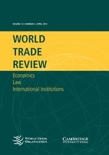
World Trade Review
Championing Research at the Crossroads of Economics and LawWorld Trade Review is a prestigious academic journal published by Cambridge University Press, focusing on the intricate dynamics of international trade, economics, law, and political science. With its ISSN 1474-7456 and E-ISSN 1475-3138, this journal has been a cornerstone of scholarly communication since its inception in 2002 and is poised to continue contributing to its field until 2024. Notably, it holds a Q3 ranking in Economics and Econometrics, and Q2 in both Law and Political Science and International Relations, emphasizing its critical role in advancing knowledge across these disciplines. Additionally, the journal enjoys commendable Scopus rankings, with a 79th percentile in Law and a 71st percentile in Political Science, affirming its relevance and impact in academic research. Although not currently an open-access publication, it remains a vital resource for researchers, professionals, and students eager to explore and contribute to the evolving landscape of global trade and its multifaceted implications.
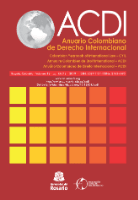
Anuario Colombiano de Derecho Internacional-ACDI
Fostering Scholarly Excellence in International LawAnuario Colombiano de Derecho Internacional-ACDI, published by UNIV ROSARIO, EDITORIAL, is a pivotal open-access journal established in 2008, focusing on the field of international law. Situated in Colombia, this journal serves as a vital platform for scholars, practitioners, and students to disseminate and discuss pivotal legal issues that resonate within an increasingly globalized context. With an impact factor reflecting its relevance—ranking in the Q3 category of law and positioned at the 33rd percentile among legal journals in the Scopus ranking—ACDI is a commendable source for academic research. The journal operates under a rigorous peer-review process, ensuring high standards of scholarly communication. Its commitment to accessibility fosters a broader dialogue among legal professionals worldwide, making it an essential resource for advancing knowledge and discourse in international law.